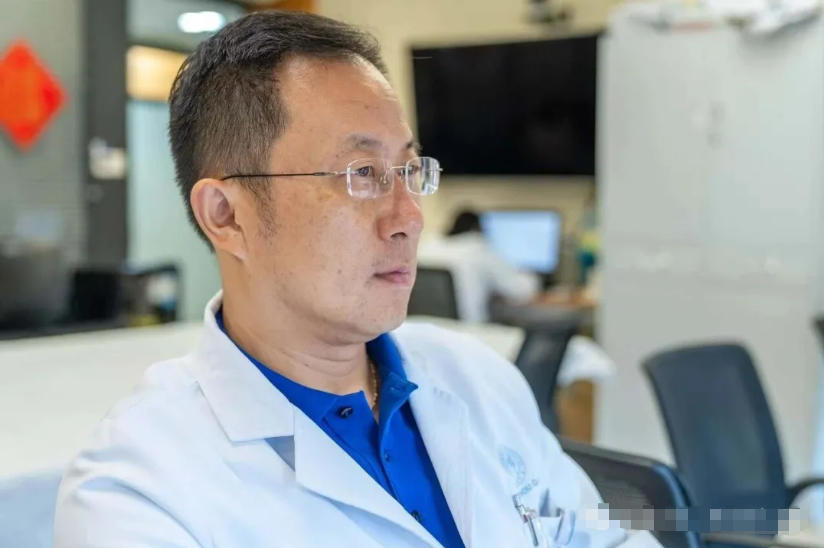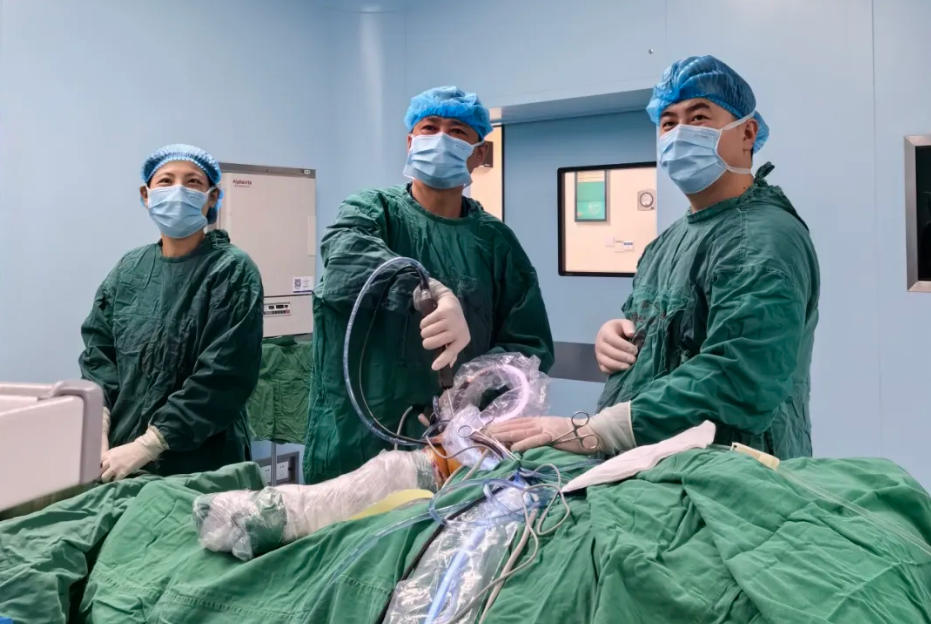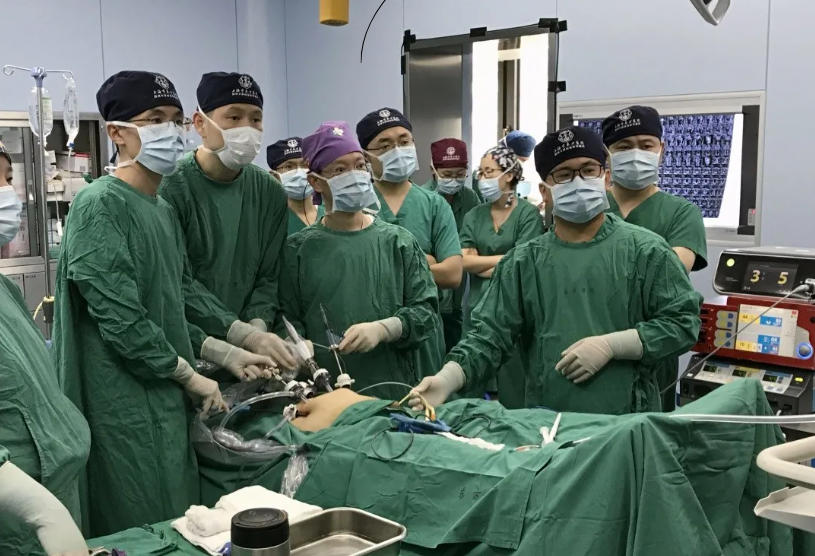Update time:2025-09-01Visits:5071

Chen Yingxuan, Gastroenterology, Second-Level Professor, Chief Physician at the Department of Gastroenterology, Renji Hospital
Introduction:
Balancing a busy schedule with a positive attitude, she demonstrates both diligence and attention to detail…
She carries herself with an elegant yet approachable demeanor characteristic of Shanghai. This warmth and grace typically develop through life’s challenges and personal growth, reflecting a mature sophistication.
She has been a dedicated professional at Renji Hospital since her graduation, seamlessly moving between research and clinical practice each day.
In her work, she recognizes others’ strengths, accepts their limitations, treats everyone with fairness, and handles situations with composure. It is perhaps this balanced approach that enables her to effectively bridge the gap between clinical practice and research, supporting the operations of the Gastroenterology Department at Renji Hospital. She believes that life is enriched through purposeful pursuit, and that people achieve greater strength through collaboration.
Way to be a doctor
During her childhood, Chen Yingxuan’s home was situated at the intersection of Shanghai’s former Nanshi and Luwan districts. In the Shanghai of those years, the charm of the traditional alleyways (known as longtang) wove through every corner like a spider’s web, creating distinctive scenes reminiscent of aged photographs. Against the backdrop of historical changes and daily life, the weathered rooftops bore witness to the passage of time.
“My middle school was adjacent to Shanghai Second Medical University. I can still recall the medical students rushing past each day, whom I deeply admired. The university buildings stood out in my memory as particularly beautiful, arranged like stately guardians of the city’s heritage, their facades shaped by decades of history. Beyond the campus, the narrow alleyways functioned like the city’s circulatory system, connecting one household to another. Even now, I can remember the atmosphere of those times.”
Although the alleyways have since deteriorated and the old landscapes have faded with time, Chen Yingxuan’s memories remain vivid and cherished.
Before her high school entrance examinations, Chen Yingxuan’s uncle suddenly developed gastrointestinal bleeding, prompting the family to rush him to the hospital. Her parents maintained a constant presence at his bedside. One evening, the attending physician revealed that her uncle had an abdominal mass, possibly indicating colon cancer, which deepened the family’s concern.
“Fortunately, my uncle underwent successful surgery to remove the colon cancer, and with the medical team’s expertise, he overcame the illness and has remained healthy since. Although this occurred over forty years ago, I can still clearly picture my parents discussing my uncle’s condition each day. This experience likely cemented my decision to pursue medicine. My family background was in science and technology—my parents graduated from Nanjing Institute of Technology, and my sister works in computing. At that time, we all felt that having a physician in the family might bring us greater security and wellbeing.”
With her outstanding academic achievements, Chen Yingxuan earned admission to Shanghai Second Medical University. As her medical knowledge expanded, she developed more profound insights into healthcare, reinforcing her commitment to becoming an exceptional physician.
After graduation, Chen Yingxuan joined Renji Hospital as a resident physician. During her rotations, she had the valuable opportunity to observe insightful discussions among senior department heads.
“I particularly remember a fascinating case discussion between Professor Xiao Shudong and Professor Zeng Minde concerning a patient with demyelination.”
Professor Zeng Minde, composed and highly knowledgeable, had a compelling way of presenting cases with his resonant voice. During the discussion, he effortlessly referenced a similar case from a medical journal and incorporated perspectives from colleagues. Professor Xiao Shudong nodded in agreement, acknowledging Professor Zeng’s insights while contributing his own analysis to the conversation. Witnessing their expertise and critical thinking abilities, Chen Yingxuan found herself inspired by the intellectual depth of gastroenterology.
Chen Yingxuan had additional motivations for specializing in gastroenterology.
“Many patients seeking medical care initially present with digestive symptoms, regardless of whether their underlying condition is uremia, rheumatic disease, or something else entirely. This requires physicians to take thorough medical histories, apply analytical thinking, and arrive at accurate diagnoses. Such diagnostic challenges demand continuous learning and professional development. I find these challenges both demanding and deeply rewarding.”
Chen Yingxuan recognized that choosing gastroenterology would involve ongoing growth and self-challenge. She understood that the field requires not only comprehensive medical knowledge but also a strong sense of responsibility and patience. Even seemingly minor details might conceal crucial diagnostic clues, demanding careful consideration and judgment.
From that point forward, Chen Yingxuan felt confident in her ability to help more patients through gastroenterology, finding both professional fulfillment and purpose in this career path.

Guiding Lights in Gastroenterology
“Throughout my career, I’ve been profoundly shaped by exceptional mentors and the rich legacy of Renji Hospital’s gastroenterology department. Academician Jiang Shaoji, Professors Xiao Shudong, Zeng Minde, Qiu Dekai, and Fang Jingyuan each played pivotal roles in my development.”
Chen Yingxuan vividly recalls Academician Jiang Shaoji’s calm professionalism when diagnosing his own lung mass: “Despite the personal nature of his condition, Academician Jiang maintained remarkable composure, methodically explaining his clinical reasoning. His decades of expertise enabled him to analyze his case with extraordinary objectivity. Though we junior doctors present that day were emotionally overwhelmed, the experience proved invaluable for our professional growth.”
In Chen’s view, Professor Xiao Shudong embodied the spirit of academic innovation. Driven by curiosity about uncharted territories, he relentlessly pursued technological breakthroughs. His introduction of capsule endoscopy to China exemplifies this: after discovering the technology at Digestive Disease Week (DDW) in the United States, he recognized its potential to revolutionize small intestine diagnosis—a longstanding challenge in endoscopic medicine. Upon returning, he spearheaded its implementation, establishing China’s first capsule endoscopy program.
“Professor Xiao’s vision extended beyond technology. He founded our department’s inflammatory bowel disease (IBD) subspecialty, positioning us at the forefront of this emerging field. His academic approach combined passionate innovation with fearless exploration of the unknown. He possessed an exceptional ability to identify emerging trends and drive scientific progress.”
Now 88, Professor Zeng Minde represents the ideal of lifelong learning in medicine. “Even approaching ninety, he dedicates 30-60 minutes daily to reviewing medical literature,” Chen notes. “During our visits, his desk remains stacked with printed journals, often illuminated by his reading lamp—a decades-long ritual. Time hasn’t dimmed his intellectual curiosity; his mind stays remarkably sharp, eyes still sparkling with enthusiasm for new discoveries.”
Professor Qiu Dekai’s groundbreaking work in autoimmune hepatitis built a new field for Renji’s gastroenterology department. “The field Professor Qiu pioneered remains among the most dynamic frontiers in contemporary gastroenterology research.”
Renji Hospital’s tradition of excellence continues through new generations of scholars. Today, Professor Fang Jingyuan stands among China’s leading gastroenterologists.
“Professor Fang brings exceptional rigor to his research, demonstrating remarkable insight in gastrointestinal oncology. His leadership focuses on early detection and prevention of gastric and colorectal cancers—critical given that early-stage digestive tumors boast up to 95% survival rates. By shifting our focus to prevention and early intervention, Professor Fang has established transformative research programs that have significantly advanced our field.”
Chen emphasizes Professor Fang’s commitment to translating research into clinical practice: “His ability to bridge laboratory discoveries with patient care exemplifies applied medicine. Under his guidance, our department has made substantial strides in gastrointestinal cancer prevention and treatment.”
Now mentoring doctoral students herself, Chen feels responsible for perpetuating Renji’s legacy. “I guide students to understand research’s true purpose: integrating scientific inquiry with clinical practice to enhance patient care. They must develop critical thinking skills, logical rigor, and literature analysis techniques. We’re fellow explorers in this journey—courageously advancing into uncharted territories together. I often invite them: ‘There’s so much more to discover in this field. Will you join me in exploring it?’ This approach sparks curiosity while demonstrating research’s transformative potential.”
Chen encourages students to master emerging technologies like artificial intelligence and advanced analytical tools. “Our weekly or biweekly discussions create space for mutual growth. Through these exchanges, students learn to formulate meaningful questions. My goal is to nurture their passion for research—or at least help them find fulfillment in it. I follow two core principles: First, students must develop independent thinking. They need to articulate their research rationale clearly and defend their perspectives convincingly. Second, establishing trust is essential. I provide unwavering support for their work. This collaborative model fosters optimal growth for both students and our research community.”

Bridging Research and Clinical Practice
In clinical medicine, Chen Yingxuan’s work stands out for seamlessly integrating research with patient care, prioritizing real-world applications.
“I specialize in digestive system cancers, with a particular focus on colorectal cancer.”
For Chen Yingxuan, strategic research focus is paramount. From 2008 to 2018, she navigated challenges and secured key funding—including talent development grants—that bolstered her team’s confidence and research infrastructure.
“Reflecting on that decade, those achievements demanded perseverance. Securing clinical research funding is vital for advancing scientific inquiry. When tackling national-level projects, our gastroenterology department at Renji Hospital consistently evolves by uniting experts across disciplines toward shared objectives. Take Professor Fang Jingyuan’s RCT on colorectal adenoma prevention: a five-year, multi-center study involving over 1,000 patients—a monumental effort. Unlike lab-based research, our work requires coordinating clinical teams, managing complex logistics, and addressing patient adherence.”
The referenced study—a randomized, double-blind, placebo-controlled trial—evaluated berberine’s efficacy in preventing colorectal adenoma recurrence. Led by Renji Hospital and six collaborating centers, it enrolled nearly 1,000 patients (ages 18–75) post-adenoma removal. Participants received berberine or placebo, with regular colonoscopies tracking recurrence over two years. Results revealed significantly lower adenoma recurrence rates in the berberine group, especially for high-risk cases. This demonstrated berberine’s safety and effectiveness in reducing recurrence risk, providing a robust foundation for post-removal care.
Chen Yingxuan emphasizes that impactful research requires sustained focus on viable directions, deep mechanistic exploration, intervention innovation, and relentless pursuit of clinical translation.
She advocates for interdisciplinary collaboration, stressing that gastroenterology’s future hinges on partnerships with oncology, surgery, and bioinformatics. Such synergy enables the design of innovative, practical frameworks that harmonize research with clinical needs.
“Some projects take years to yield results, but persistence is non-negotiable. We must remain grounded, resilient, and committed to our scientific goals.”

Patients at the Heart of Care
“As clinicians, communication is paramount. While medical training prioritizes technical skills, humanities education is equally vital. Engaging patients demands empathy and wisdom—not just technique. When mentoring trainees, I stress involving patients in treatment planning. This requires active listening to understand their needs and fears. By adopting their perspective, we guide them more effectively and align treatment with their values.”
Years of practice have shown Chen Yingxuan that most patient concerns are reasonable. Compassion resolves many issues, builds trust, and improves compliance—even when patients struggle to grasp complex diagnoses.
She also believes clinicians must advance public health through community screening, education, and outreach. Shanghai’s colorectal cancer screening program shows promise but faces hurdles:
“Even when residents test positive for fecal occult blood, few pursue follow-up endoscopies, limiting screening efficacy. We need more sensitive detection methods and sustainable funding to boost early diagnosis rates and improve outcomes.”
Chen Yingxuan urges greater support for screening initiatives to expand access and enhance public health services.
“I often reflect on our role beyond cancer treatment: screening, education, and outreach may seem small-scale, but their societal impact is profound. Our work connects tumors to broader clinical challenges.”
Under Professor Fang Jingyuan’s leadership, Chen Yingxuan and colleagues have spearheaded public health initiatives to make cancer prevention resources accessible. Through science communication, hospitals empower communities with knowledge, driving preventive action and elevating public health.
“Science communication is transformative. Our efforts can improve countless lives. We actively engage with media and medical societies, and I encourage young doctors—regardless of specialty—to contribute to community education.”
Having witnessed Renji Hospital’s expansion from a single campus to a network including Hangzhou Bay and Nantong facilities, she feels privileged to contribute to its growth.
“We envision deeper integration across departments—surgery, radiology, pathology, and beyond. This collaboration will cement Renji Hospital’s future as a pioneering, influential institution.”
Editor: Chen Qing @ ShanghaiDoctor.cn, If you'd like to contact to Dr. Chen, please be free to contact the email of Chenqing@ShanghaiDoctor.cn.
Note: Chinese Sources from “The Path of Benevolent Medicine” which was published in 2024. It records 90 important medical figures in the history of Renji Hospital. Yewen Renyi (ShanghaiDoctor.cn) team was one of the major writers of the book and is authorized by Renji hospital to create English version on the website of ShanghaiDoctor.cn
Hospital: Renji Hospital, Shanghai Jiao Tong University School of Medicine
Dr. Zhou Qianjun | “Sculpting Life in the Chest” – A Portrait” – A Portrait
Dr. Cai Junfeng | Guarding Bone and Joint Health, Improving Quality of Life
Dr. Xu Xiaosheng|The Gentle Resilience of a Male Gynecologist
Dr. Shi Hongyu | A Cardiologist with Precision and Compassion
Dr. Zhang Guiyun|The Inspiring Path of a Lifesaving Physician
Dr. Chen Bin | Building the Future of ENT Surgery at Lingang,Shanghai
Prof. Zhang Baigen | The Oral History of China’s Vascular Surgery

Dr. Zhou Qianjun | “Sculpting Life in the Chest” – A Portrait” – A Portrait

Dr. Cai Junfeng | Guarding Bone and Joint Health, Improving Quality of Life

Dr. Cui Xingang | The Medical Dream of a Shanghai Urologist

Dr. Xu Xiaosheng|The Gentle Resilience of a Male Gynecologist

Dr. Shi Hongyu | A Cardiologist with Precision and Compassion

Dr. Zhang Guiyun|The Inspiring Path of a Lifesaving Physician

Dr. Jiang Hong | Bringing Hope to Vascular Frontiers

Dr. Huang Jia | A Journey of Healing "Breath"

Dr. Chen Bin | Building the Future of ENT Surgery at Lingang,Shanghai

Prof. Zhang Baigen | The Oral History of China’s Vascular Surgery